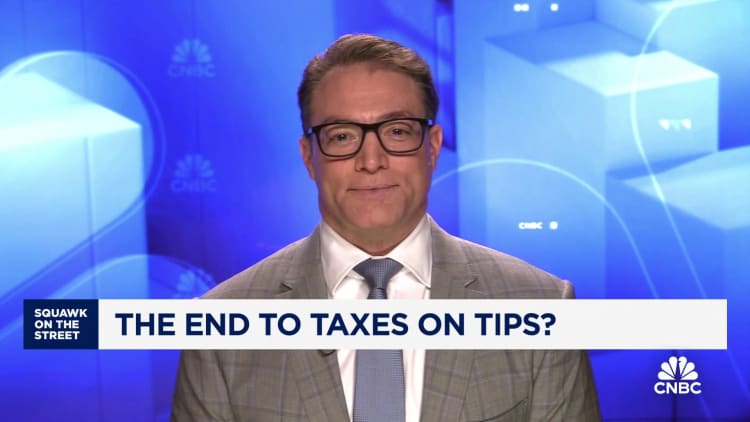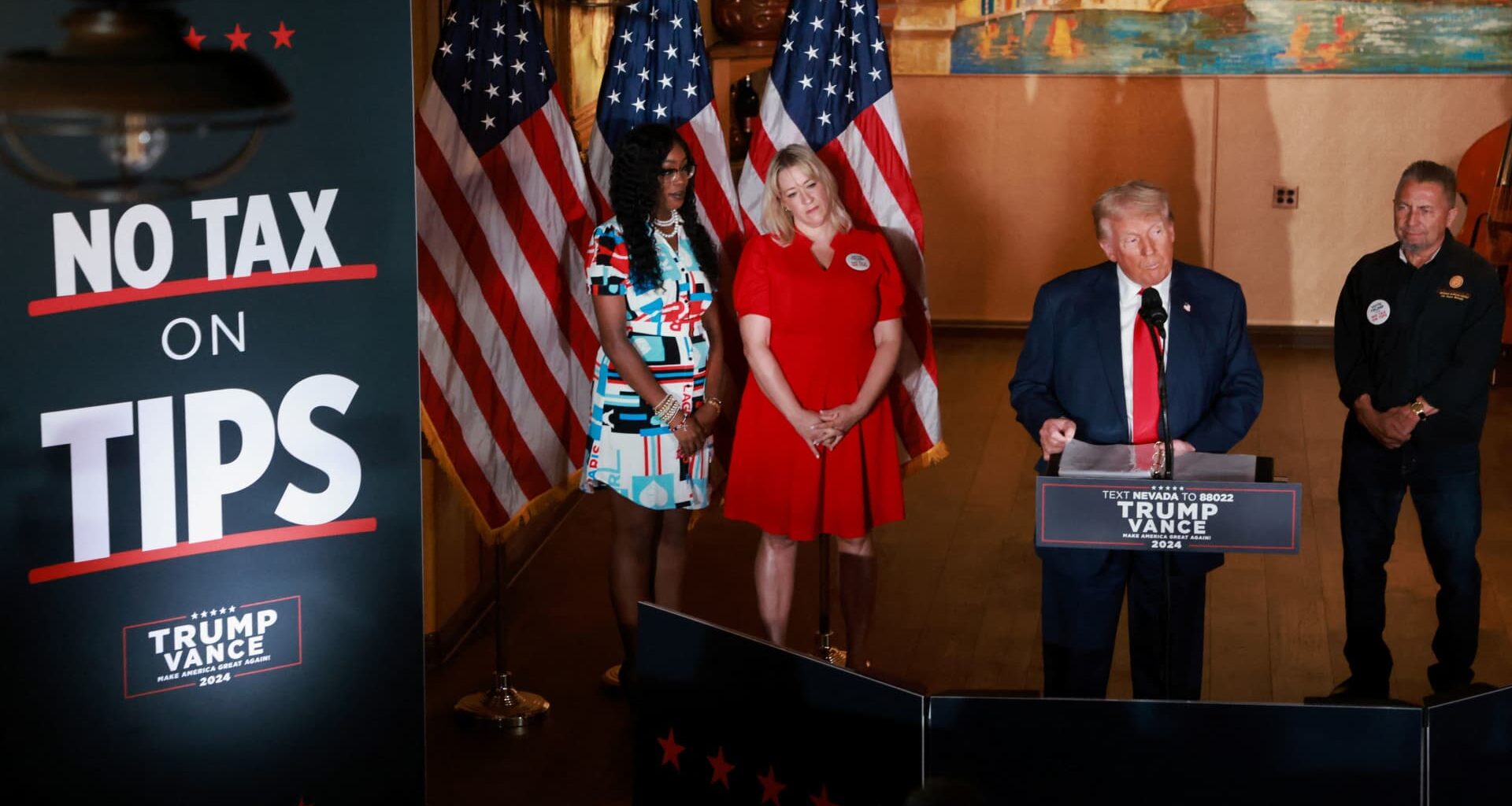Republican presidential nominee and former U.S. President Donald Trump speaks during his “No Tax on Tips” campaign event in Il Toro E La Capra restaurant in Las Vegas, Nevada, U.S. August 23, 2024.
David Swanson | Reuters
Nevada remains one of the most tightly contested swing states in the presidential election, with recent polls showing close to a virtual heat between Donald Trump and Kamala Harris. It’s also a state that has been ground zero for both candidates to promote a policy of excluding tipped income from taxes.
In June, Republican presidential candidate and former president Donald Trump told ralliers in Las Vegas — a city that includes the highest proportion of restaurant, hotel and casino workers in the country — that if elected, he would eliminate federal taxes on tipped income. Two months later, his Democratic opponent, Vice President Kamala Harris, made a similar no-tax-on-tips promise to her revelers, likewise in Vegas.
Tipped workers in both crowds — a sought-after cohort of voters in a critical swing state — cheered the prospect of putting more money in their pockets. The campaigns’ pledges also sparked related, if differing, bill proposals in both the Senate and the House. Suddenly, a concept first floated, unsuccessfully, back in 1997 by Texas GOP House member Ron Paul and subsequently revived by a few other legislators, to no avail, seemed to be gaining traction.
Upon closer inspection, however, some economists, tax experts and restaurant union and industry officials aren’t quite so sanguine about the latest iterations. “What happens in Vegas, stays in Vegas” is a catchy marketing slogan, but in this case, it could be prescient.
To begin with, the policy would only impact a small number of individuals. There were roughly four million tipped workers in the U.S. in 2023 — including restaurant servers, bartenders, barbers, taxicab and rideshare drivers and hairdressers — representing only 2.5% of the total workforce, according to the Yale Budget Lab, a non-partisan policy research center.
Put another way, among workers making less than $25 per hour — the bottom half of all employees — less than 5% receive tips. Zeroing in on just the nearly 2.2 million servers and bartenders, half earned a mean annual wage of $36,530 last year, or $17.56 an hour, according to the Bureau of Labor Statistics.
The proposed bills, therefore, leave out more than 95% of low- and moderate-wage workers. “It is a particularly poorly targeted way to reach low-wage workers,” said Ernie Tedeschi, director of economics at the Yale Budget Lab.
What’s more, he said, “You run into the horizontal equity problem, which is a fancy way of saying fairness, even among low-wage workers in jobs that we think of as similar.”
Uneven tax break benefits
Hypothetically, consider a waitress at a quick-serve restaurant who makes $34,000 a year, of which $19,000 comes from tips. One of her co-workers, a cashier, makes the same amount in hourly wages. If the waitress’ tipped income is 100% deductible, and she takes the IRS 2024 standard deduction of $14,600, she’ll receive a $1,656 refund. The cashier, though, is only entitled to the standard deduction and will owe Uncle Sam $2,096.
“One will potentially get a benefit and one will not,” Tedeschi said. “Yet both are low-wage workers and under this rationale are deserving of this sort of benefit. There are other low-wage workers not in food service, such as home health workers and custodians, who will never see a benefit from this.”
There’s the fact, too, that 37% of tipped workers had incomes low enough that they faced no federal income tax in 2022, Tedeschi estimated. Many of them also qualify for other forms of tax relief, such as the Earned Income Tax Credit and the Child Tax Credit, to the extent that they wipe out any federal income tax liability.
An advertisement for Democratic presidential nominee and U.S. Vice President Kamala Harris and her running mate, Minnesota Gov. Tim Walz, is displayed on the 580,000-square-foot Exosphere at Sphere, the first political campaign to do so, on October 30, 2024 in Las Vegas, Nevada.
Ethan Miller | Getty Images News | Getty Images
Then there’s the differences in the proposed legislation. The Senate bill, the No Tax on Tips Act, introduced by Ted Cruz (R-Texas), would allow workers to claim a 100% above-the-line deduction for cash tip income, including physical currency, debit or credit card payment and checks. Under Cruz’s plan, as well as a companion House bill offered by Rep. Byron Donalds (R-Florida), employees and employers would still each owe a 7.65% payroll tax — which funds Social Security, Medicare and unemployment insurance — on tipped income. (Another House bill, the Tax-Free Tips Act of 2024, initiated by Thomas Massie (R-Kentucky) and Matt Gaetz (R-Florida), would exempt tips from both income and payroll taxes.)
Critics argue that the GOP bills lack guardrails which, under current IRS rules, might allow high-income earners, such as hedge fund managers, lawyers and accountants, to game the system and enjoy a tax windfall. Highly paid professionals might be able to find ways to restructure their wages, bonuses or even profits as tips, according to an analysis by the Center for American Progress. For instance, a married couple making $1 million in wages who converts half of their compensation into tips would receive a $180,000 tax cut from the No Tax on Tips Act.
“Tips have to be voluntary, so you could also see the introduction of tipping customs in marginal service jobs,” said Alex Muresianu, a senior policy analyst at the Tax Foundation. An auto-body shop or a housing contractor “might start setting lower prices and asking for tips,” he said. Without guardrails, that type of reclassification could be difficult for the IRS to enforce, Muresianu said.
On the other side of the aisle, following Harris’ proposal, Rep. Steven Horsford (D-Nevada) submitted the Tipped Income Protection and Support (TIPS) Act. In addition to exempting tips from federal income tax (up to a threshold of $75,000 as a way to thwart high earners), the bill aims to eliminate the subminimum wage for tipped workers.
Taking a minimum-wage worker tax battle to Capitol Hill
Under the Fair Labor Standards Act, the federal minimum wage is $7.25 per hour and $2.13 for workers who receive more than $30 a month in tips. Employers can take a so-called tip credit of $5.12 as a way to bring tipped workers up to at least the minimum wage. Many states have established a higher minimum wage and seven, including Nevada, have done away with the subminimum wage. The TIPS Act would exclude it nationwide and push to raise the minimum wage.
The Culinary Workers Union Local 226, which represents 60,000 hotel and restaurant workers in Nevada, was skeptical of Trump’s proposal and Cruz’s bill, because they didn’t address the minimum wage, but has endorsed Harris’ plan and the TIPS Act. “There are two sides to the same coin,” said Ted Pappageorge, the union’s secretary-treasurer, referring to no tax on tips and going after the subminimum wage. “We need to do both to really help the working class and low-income and middle-class tip earners, too,” he said. “Tip earners are willing to pay their fair share, we just think there’s been an overreach [by the IRS].”
The National Restaurant Association, comprising more than a million restaurant and foodservice outlets and 15.5 million employees, didn’t even have the no-tax-on-tips idea on its comprehensive tax agenda before Trump’s pronouncement, said Sean Kennedy, the association’s executive vice president for public policy. But once Cruz seized on it, “We had a series of very good conversations with [him] on the bright lines that the restaurant industry wanted to see if this was going to be formalized into legislation,” Kennedy said.
The association wanted to ensure that tip wages, while tax exempt, were still reflected on workers’ W-2s so they could qualify for loans and access credit. It also lobbied to keep payroll taxes intact, to ensure workers were still paying into the Social Security Trust Fund for their retirement, Kennedy said. “This is a complicated issue, and to do this right is going to require a lot of continued thought and consideration by Congress.”
As for Horsford’s TIPS Act, although agreeing with its ending taxes on tips, “we are absolutely, strongly opposed to eliminating the tip credit and the tipped [subminimum] wage,” Kennedy said. “Most servers get far more than the minimum wage because of what the tipped wage allows,” he said, alluding to the tip credit.
The association is also “ready for a real conversation on the future of the federal minimum wage,” Kennedy said, but with a caveat based on restaurants’ labor costs, which have risen and fallen since 2018. “If the answer is to simply increase the minimum wage and everyone will either sink or swim, a lot of restaurants are going to sink,” Kennedy said, thus the association “would oppose a simple lined increase in minimum wage.”
Finally, as with any federal tax cut, there’s the question of how much it will decrease the Treasury’s reserves. The Yale Budget Lab estimates an income tax-only version would cost $107 billion over 10 years, but about $62 billion with worker restrictions in place. The non-partisan Committee for a Responsible Federal Budget calculates a range between $150 billion and $250 billion for a version that also exempts tips from payroll tax.
Regardless of the outcome of the election, the next Congress is set to debate the 2017 Tax Cut and Jobs Act in 2025, when many of its provisions expire, including the standard deduction, individual tax rates and the child tax credit, all of which impact a wide swath of the workforce. Whether the no-tax-on-tips bills enter the fray is unpredictable.
“It’s too early to tell,” Kennedy said, considering that the White House and Congress are fully in play, though he added, “we fully expect that a Trump administration would make this a priority.”
Meanwhile, restaurant union rep Pappageorge says, “the only chance of this happening is if [Harris] wins.”
Noting that both parties are on the bandwagon and the fiscal cost isn’t huge, Tedeschi said he thinks “this is the likeliest policy proposal out of the 2024 campaign to actually become a reality.”
Muresianu, meanwhile, favors alternative solutions for helping working-class workers. “Whether it’s expanding the EITC or the CTC, or increasing the standard deduction, they would all be better than no tax on tips,” he said.

